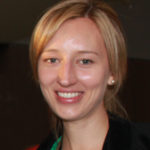

2012 Young Scholars: Casey Doolette

University of Adelaide
I found the conference very beneficial because it made clear to me many issues that I am not directly exposed to in my PhD project.
I was lucky enough to be supported by the Crawford Fund to attend their 2012 Annual Parliamentary conference, ‘The Scramble for Natural Resources: More Food, less Land? The conference demonstrated the global agricultural and food security issues that future populations are going to face. I found the conference very beneficial because it made clear to me many issues that I am not directly exposed to in my PhD project.
Two speakers that I particularly enjoyed were Professor Jonathan Foley and Dr. Nteranya Sanginga. Professor Foley outlined the problems that future populations are going to face in terms of food security and availability. He also stressed the importance of integrated solutions to these problems; it is not simply a matter of increasing food production, the solution must take into account environmental and social systems. By 2050 the population will increase by another 4 billion people. However, as Prof. Foley explained, it is not this massive population increase that will have the greatest impact on food availability; instead it is changing diet patterns. This is already evident in countries that have seen the recent development of a larger middle class as communities overcome poverty. When this has occurred, the population usually demands a more Western type diet, a diet that is very high in meat consumption. This type of diet will simply not be sustainable in 2050 because this will mean an 85% increase in meat production.
Professor Foley made it clear that natural resources and the environment will suffer dramatically if this adaption occurs. For example, 35% of greenhouse gases are due to agriculture and this will only increase with deforestation. What I found particularly shocking was the food wastage in Western countries, which is approximately 1/3 of all food produced. However Prof. Foley also explained the potential solutions. They will involve a huge shift in current agricultural practices and diets. Potential solutions must also take into account sustainable intensification, reduction of wastage (food and nutrients) and a rethink of biofuels. It was startling to find out that 40% of corn in the US is used for ethanol production.
Dr. Sanginga explained the issues from an African point of view. As a soil scientist, I found his explanation for the necessity of a ‘Brown Revolution’ very interesting. This revolution must involve better management of soil fertility and an increase in concentration of soil nutrients, but as he explained, 40% of African soils are unresponsive to fertiliser. As I am currently studying a PhD in soil science, this demonstrated to me that my research does have the potential to have international applications.
The second theme of the conference that I found particularly interesting was the importance of women in addressing global agricultural issues. In most developing countries women are the primary farmers and food producers for their family or village. It was demonstrated that empowering women, providing education and training them in new agricultural techniques will be key in overcoming future food shortages. However, I worry that the solution will not be this simple and it will require an entire shift in the way many societies and governments function. As in developed countries, the majority of policy makers in developing countries are male and shifting this to be more gender equal will be very challenging. My second highlight was meeting other young scholars who also have a similar passion for agricultural research. I enjoyed meeting such a diverse group of young researchers, all of whom were involved in very different projects from investigating the distribution of apple growing areas to crop management techniques for improving grain yields. It was a great opportunity to network with the scholars but to also hear about the challenges that they are facing in their projects.
Another highlight was hearing about the many international projects that Australia is directly involved in. I was introduced to a number of organisations I did not previously know of, such as the Australian Agricultural and Resources Economics Society (AARES) and the Australian branch of The World Vegetable Center (AVRDC). It was very interesting to speak to these sponsors and to hear about their project such as AVRDC’s success in developing high yielding vegetables with increased pest, disease and heat tolerance.
The final highlight for me was meeting African PhD students and discussing their projects and their conclusions from the conference. It was interesting to hear that a few students believed that Africa was sometimes stereotyped as a place of widespread poverty and of hopelessness. However, this is not the case and in terms of agricultural research there have been major advances over the previous decade.
I would like to thank the Crawford Fund for awarding me a scholarship to attend this conference. It has taught me a great deal about international agricultural and food security issues and has further encouraged me to pursue a career in international agricultural research.